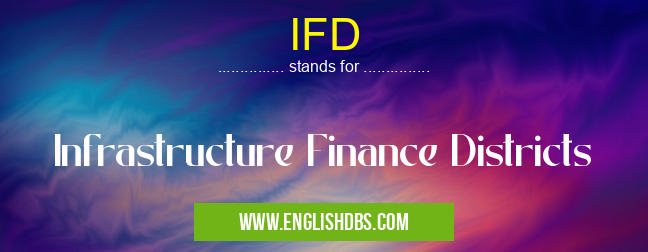What does IFD mean in FINANCE
Infrastructure Finance Districts (IFDs) are local economic development districts created through public-private partnerships. The purpose of an IFD is to finance the construction, improvement, and maintenance of infrastructure facilities within a geographically defined district. These districts are mainly used when a municipality or county needs additional funding for necessary improvements.

IFD meaning in Finance in Business
IFD mostly used in an acronym Finance in Category Business that means Infrastructure Finance Districts
Shorthand: IFD,
Full Form: Infrastructure Finance Districts
For more information of "Infrastructure Finance Districts", see the section below.
Essential Questions and Answers on Infrastructure Finance Districts in "BUSINESS»FINANCE"
What is an Infrastructure Finance District?
An Infrastructure Finance District (IFD) is a local economic development district created to finance the construction, improvement, and maintenance of infrastructure facilities within a geographically defined area.
What types of infrastructure can be funded by an IFD?
Typically, IFDs are used to fund transportation projects such as roadways and bridges, public works such as water systems, sewers, and airports, and telecommunications networks. They may also fund urban redevelopment projects like housing developments and commercial centers.
How do IFDs generate revenue?
IFDs generate revenue by issuing bonds that are paid back with property taxes collected on properties within the district. The bonds often have maturities of 20 years or more. The revenues from these bonds can then be used to fund infrastructure projects that have been approved by voters in the district.
Who administers an IFD?
An appointed board typically oversees the administration of an IFD by managing budgets and making decisions about funding projects or issuing debt instruments. These boards must answer to elected bodies such as city councils or county commissions who approve any new projects or issues related to their budget allocations.
What type of approval is needed for an IFD project?
Any proposed infrastructure projects need approval from both the municipal government board overseeing the district as well as a majority of voters in the geographic area where the project will take place in order to receive funding from an Infrastructure Finance District (IFD).
Is there a cap on how high taxes can go for properties within an IFD?
Generally speaking, yes - bond proceeds from Infrastructure Finance Districts cannot exceed 115% of total property taxes assessed against property owners prior to formation of the district. Cities may also set comparable maximum rates for any particular project undertaken by an IFD in order for it to remain viable and cost-effective over time.
Are there other ways besides bonds that can bring money into Infrastructure Finance Districts?
Yes - other sources of money which can be accessed include federal grants, general obligation bonds issued outside the district but dedicated towards its infrastructure developments, state loans or loan guarantees directed to support specific projects within it's purview", philanthropic donations and other forms of private capital investments made directly into approved infrastructural improvements.
Final Words:
Infrastructure Finance Districts provide municipalities and counties with much needed additional sources for financing necessary public improvements, allowing citizens access to improved public services through measures like bond issuances backed up by taxes levied against those living inside these specially demarcated areas. With funds generated in this way, cities now stand better equipped tackle major investment initiatives without having resorting solely relying upon tax revenue exclusively provided at higher levels.
IFD also stands for: |
|
| All stands for IFD |
